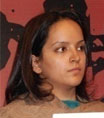REW Governing Council
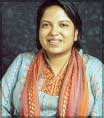
Organization:
Samarthya,National Center for Promotion of Barrier-Free Environment For Disabled Persons (A project of Samarthyam- Regd. No. 35922)
Designation: Executive Director& Access Advisor
Postal Address: B-181, Mansarovar Garden, New Delhi-110015 (India).
Tel: 91-11-41019389, (M) 9810558321
E-mail: samarthyaindia@yahoo.com
Web site: www.samarthyaindia.com
Personal details
Date of Birth: 23th August 1968
Ed.Qualifications: Bachelor of Science (Hon ours), Fashion & Apparel Technology, University of Delhi.
Training Experience: 2000, United Nations Economic and Social Commission for Asia and the Pacific (UNESCAP) on Promotion of Accessible Tourism at Bali, Indonesia. 2002, UNESCAP on Non-Handicapping Environment for Disabled People at Bangkok, Thailand. 2004, Asia Pacific Development Centre on Disability (APCD) on Non-Handicapping Environment Workshop for National Trainers and Policy Makers, Bangkok (Thailand) 2004, Presented papers at 10th International Conference on Transport & Mobility for Elderly and the Disabled, Hamamatsu, Japan.
Awards: 2003, National Award – Role Model, presented by Hon’ble President of India2005, Cavinkare Ability Mastery Award 2005, Social Act of Courage- 13th Red & White Bravery Gold Award, Delhi State (Samarthya)
Disability: Muscular Dystrophy (assisted wheel chair user) needs escort for activities of daily living.
Anjlee Agarwal is presently member of Working Group on Empowering the Disabled (Barrier Free Environment and Social Awareness), Ministry of Social Justice & Empowerment, Government of India; for the XI Five Year Plan: 2007-2012.
Profile of Activities:
1) Awareness & Capacity Building Excursion Tours: Since 1996, organized more than 60 tours for persons with severe disabilities to places of historical, cultural, religious and tourist interests’ promoting the concept of Barrier-Free Tourism.
2)Dilli Haat: In 2002, conducted access audit of Dilli Haat (a popular Tourist spot in Delhi) to make it “Accessible to All”. Delhi Tourism & Transport Development Corporation (DTTDC), Government of Delhi; implemented the recommendations forwarded in 2003-05. Dilli Haat received National Award (President’s Award) for Promotion of Barrier Free Environment (BFE) on 3rd December 2005, International World Disability Day. A photographic exhibition on “Making of Barrier Free Dilli Haat” was jointly organized by Samarthya and Delhi Tourism in December 2005.
3)Bus Rapid Transit System (BRTS), 2003: Associated with Transportation Research & Injury Prevention Programme (TRIPP) Indian Institute of Technology (IIT), Delhi on accessible designs for low floor bus, bus shelters and corridors/dedicated lane for the proposed BRTS.
4)Delhi Metro Rail Corporation (DMRC): An access audit of the sample station was conducted in April and followed it till its completion in November 2002. Samarthya is associated with DMRC to make the system user friendly and 110 stations of Delhi Metro to have Universal Design. The work is still being followed. Samarthya is now associated with Bangalore Metro Rail Corporation Ltd. (BMRCL) also, to provide Universal Design in the upcoming Metro in Bangalore. A presentation of DMRC was made at BMRCL in August 2006 and the suggestions/recommendations were forwarded to MD, BMRCL.
5)For Rehabilitation Council of India (RCI) (Statutory body under the Ministry of Social Justice & Empowerment, Government of India) 2003:Resource Persons at “Summit of the Minds”, Delhi Organized ‘Training of Trainers Course for Promotion of Non-Handicapping Barrier Free Environment for RCI at Bangalore & Chennai
6)Resource Persons at Training of Trainers Course for Promotion of Non-Handicapping Barrier Free Environment and creation of Resource Pool of Access Auditors:Post Earthquake reconstruction work in Gujarat, 2003 National Seminar on PwDs and Elderly, Kolkatta (West Bengal) 2004, organized by the Ministry of Social Justice & Empowerment and IIT, Kharagpur Department of Social Welfare, Government of Goa, Goa 2004
7)Office of the Chief Commissioner for Persons with Disabilities(Statutory body under the Ministry of Social Justice & Empowerment, Government of India): Resource persons for “Creation of Resource Pool of Access Auditors” 2-day Workshops at Lucknow (Uttar Pradesh), Chandigarh (Union Territory) and Raipur (Chattisgarh), 2005-06. Around 300 participants from 14 States with diverse backgrounds including architects, engineers and urban planners and NGO’s were trained on importance of BFE and practical field visit i.e. access audit and report presentation.
8)Following the Post-Tsunami reconstruction work: Organized 3-day workshop in June 2005 and August 2006 in Port Blair & Rangat, Andaman Island; project supported by international NGO Handicap International.
9)Access Audits (Facilities Check): of more than 60 public utility buildings are conducted in various States.
10)Disability Awareness/experiential Exercise Training Workshops: I) 5 workshops for Auto rickshaw/three wheeler drivers (Badge Training) 2003, State Transport Authority, Burari, Delhi and Delhi Transport Corporation (DTC) bus drivers II) School of Planning and Architecture (SPA), Delhi, 2005- Students of Transport Planning, Architecture and Industrial Design. III) Central Road Research Institute (CRRI), Delhi, 2006- Scientists, Researchers, Academicians, Transport, Town & Urban Planners.
11)Organized First National Conference on Accessible Transportation:“Mobility for All”, 2006: in academic collaboration with Transportation Research & Injury Prevention Programme (TRIPP) Indian Institute of Technology (IIT), Delhi, 17-19 March 2006. The very purpose of this Conference was to bring the Government, service providers, stake holders and user groups on one platform and Draft Implementation Policies and Guidelines on “National Policy on Accessible Transportation on the basis of Universal Design” addressing the concerns of PwDs and senior citizens. This Conference was the first endeavor of its kind in the country. The National Conference was supported by Union Tourism Ministry and Ministry of Social Justice & Empowerment, Government of India.
12)Publications: a) Prepared the first Technical Brochure “Access for All” on Internal & External Design Considerations. b) Author of the “Training Manual to promote Barrier Free Environment- Guidelines for Training of Trainers”, 2005 published by Rehabilitation Council of India (RCI)
Research Studies
“Accessibility of Indian Railways”, 2005: Includes users’ group perspective; facilities check of stations, reservation centre and compartment for disabled and recommendations for making Railways accessible. Low cost, tried and tested designs from developing countries and user perspective (disabled persons) and recommendations were forwarded to Research Design Standards Organization (RDSO), Ministry of Railways and other concerned departments. Samarthya is currently working on designs of accessible Railway air conditioned coaches with toilets. Recommendations are under positive consideration by RDSO.
“Promotion of user-friendly Public Transport Systems (Bus & bus shelters) in India”, 2005: Conducted a Research Study to provide user groups’ perspective on bus shelters, Low Floor Buses (LFB) and upcoming Bus Rapid Transit System by the Delhi Government with the objective to evaluate the existing infrastructure, to assess and document the present situation and to provide concrete direction involving the user groups on how to make public transport user friendly. Prepared Cost effective plan compatible with LFB (based on the principle of Universal Design) and a prototype at the Hauz Khas Bus Terminal was constructed by Delhi Transport Corporation (DTC) in March 2006.
“Promotion of user-friendly Public Transport Systems (Bus & Bus Shelters) in Delhi”, 2006: During the course of research study on accessibility of buses and Bus Q Shelters (BQS), suggestions to make the new bus shelters as per the prototype were forwarded to concerned departments. The entire route (on which the Low Floor Buses are plying) i.e. from Hauz Khas terminus to Shivaji Stadium terminus has been selected for the same. Ministry of Social Justice & Empowerment sanctioned Rupees 10 million to DTC to make 70 bus shelters. Drawings and sketches with universal designs of Bus Queue Shelters are being considered by both DTC - 25 BQS and New Delhi Municipal Corporation (NDMC) - 197 BQS. Samarthya is monitoring and evaluating the construction process.
Currently developing “Research & Design for making of Braille Registration plates and Audio Meters in Auto Rickshaws”
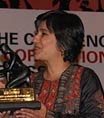
Mallika Dutt has been a pioneer in the field of human rights for more than two decades. She has worked tirelessly to reduce global pandemics like violence against women and HIV/AIDS, and to remove obstacles to women’s full participation in society from the grassroots level to UN global public policy. While women’s rights have been a primary focus of her work, Mallika has also been at the forefront of advocating for immigrant rights, racial justice, and religion and peace, particularly in the aftermath of September 11th. For the last decade, Mallika’s commitment to advancing human rights has been implemented through her creative and visionary leadership of a new kind of non-profit organization, Breakthrough: building human rights culture, which she launched in 2000 with the path-breaking album and music video, Mann ke Manjeere, an album of women’s dreams. . In keeping with Mallika’s vision that men and women must be joint partners to end the pandemic of gender-based violence, Breakthrough’s Bell Bajao campaign calls on men and boys to take proactive action to intervene in situations of domestic violence. Mallika believes that an effective human rights approach is needed to uplift the voices of those who are marginalized and abused, and simultaneously involve all sectors of society to find meaningful solutions for lasting change.
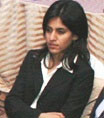
Vice President, AIESEC Having graduated from Delhi University (SRCC), she is now Vice President and Director -Western Region of AIESEC India. In the future she plans to work in an organisation concerned with animal rights. Interests - Travelling, reading, sports & theatre.
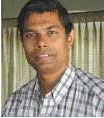
Crispino Lobo is a person well known in development circles for his knowledge and achievements in the fields of natural resource management and participatory watershed development. An alumnus of the Gokhale Institute of Politics and Economics and the Kennedy School of Government, Harvard University, Crispino has 5 academic degrees covering the fields of philosophy, theology, psychology, economics and public administration. Being passionate about making a difference in the lives of the marginalized and under-privileged, Crispino chose to commit himself to working in rural areas. Together with Fr. Hermann Bacher, he organized in 1989, the large-scale and highly successful watershed development initiative in Maharashtra called the Indo German Watershed Development Program (IGWDP). As co-founder of the Watershed Organization Trust (WOTR, founded in 1993) and the Programme Coordinator of the IGWDP, he has been instrumental in supporting and building up the capacities of 403 NGOs across the country as well as directly touching the lives of over 5,90,000 people.
In 1999, together with the then chairman of NABARD, Mr. Y.C. Nanda, he initiated the setting up of the National Watershed Development Fund by the Govt. of India to take the experiences of the IGWDP and WOTR across 100 districts in the country.
Crispino’s outstanding contribution has been to translate vision and passion into scalable accountability-based, outcome- oriented systems and processes. The approaches and management systems he has developed have been widely adopted across the country and are now being adopted abroad in development projects of a similar nature. He now heads the Sampada Trust and plans to extend its financial and entrepreneurship support services across the country, wherever poor women and youth need a partner in their struggle for betterment.
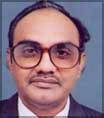
A pioneer of social research in India and an eminent mass communication expert with 40 years of distinguished background, Dr. N. Bhaskara Rao is founder Chairman of well known independent Centre for Media Studies (CMS) and also founder chairman of prestigious market research and forecasting outfit, Marketing & Development Research Associates (MDRA). Earlier, he had built up ORG as its CEO. Dr.Rao is the author and proponent of Social Audit concept/approach to appraise public utilities/services along with two former chief justices of India -- Justice P N Bhagavati and Justice R.S. Pathak. Dr. Rao pioneered Role Model Awards at National level.
Dr. Bhaskara Rao is known to different people differently. Dr. Rao is an independent analyst, strategic advisor on public policies, public opinion, reforms process, mood of situations, media trends within and across. He is known as a pioneer in social research and monitoring & evaluation and rating methodologies. To some around the country he is Social Audit expert having been the Convenor of the first Social Audit Panel in the country (for the Ministry of Communication) and later the Ministry of Environment & Forests. For many aspiring students of professional education he is known as the prime mover of BREAD (Basic Research in Education & Development) which gives scholarships to poor-needy. As Coordinator of Vision 2020, Andhra Pradesh, he initiated the project. His studies on public opinion, customer satisfaction, broadcasting agencies, advertising trends, mass communication opportunities rural marketing are the benchmarks. He pioneered psephology based election studies in India. His recent studies on electronic media, telecom and electronic sectors have guided the respective Departments in formulating perspectives and strategies. Over the years he has been advocating synergies between computer, broadcasting and telecom technology policies. Dr. Rao has been consultant with the Ministry of Health & Family Welfare for more than two decades in different capacities and conducted family planning surveys and national level studies on IEC.
Dr. Rao was also an expert member of Governments high level committee to draft National Population Policy with Dr. M. S. Swaminathan and an expert member of the committee to reorganize media units of Information & Broadcasting Ministry under the chairmanship of late G. Parthsarthy. Earlier, he was also involved as a member of high level standing Advisory Committee of I&B Ministry. He was responsible for a draft of citizen initiated Broadcasting Bill (incorporating Prasar Bharati Act) for the country. He is considered an authority on media policies in India. He is an authority on media utilization strategies and communication policies. There is no major media group in India to which he was not an advisor / consultant one time or other in the last 25 years.
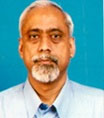
Dr. S. Parasuraman has over 25 years of experience as a teacher, trainer, activist, administrator and development worker. He has a strong foundation in critical thinking, and conceptual and analytical skills. He has always liked to be part of a larger team and has the rare ability to work in a multi-cultural and multi-disciplinary team.
Dr. Parasuraman enjoys working in challenging social, political and physical environments. His specific skills lie in:" establishing and nurturing institutions; facilitating capacity-building on rights-based approach to development; contributing to team building, conflict resolution, professional and personal development of staff at all levels in the organisations served; and managing complex programmes spread across large regions.
Dr. Parasuraman has a Master’s Degree in Anthropology from the University of Poona, Pune and a Ph.D. in Demography from Indian Institute of Technology, Bombay. He has held key positions in international organisations: as Asia Regional Policy Coordinator, ActionAid Asia; Senior Advisor to the Commission, and Team Leader of the Secretariat; World Commission on Dams; and as Programme Director, Oxfam GB, India Programme. Currently, he is Director, Tata Institute of Social Sciences, Mumbai, India.
Dr. Parasuraman has been associated with the Narmada Movement from 1987 and was a member of the Indian Prime Minister’s Committee to review the Tehri Hydroelectric Project. He has also been (i) Key member of the ‘Practioners Forum on Human Rights in Development’ (facilitated by the UNHCHR), involving UN agencies, bilateral and multilateral agencies, and NGOs with Asia regional offices based in Bangkok; and (ii) Key member of an NGO network engaged in advocacy with the Asian Development Bank. Dr. Parasuraman has over 50 publications in the form of articles in international and national journals, books and research reports.
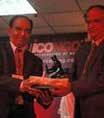
- President Brisbane Institute of Strengths based Practice
- Vice President, Australian Association of Social Workers
- Convenor, International Social Work Interest Group, Australian Association of Social Workers, Queensland
- Director, International Strengths based Strategies Conference, 2006, Hyderabad, India
- President, Coping and Resilience, Dubrovnik 2009 – An International Congress on Trauma recovery, peace and hope building.
- Secretary, SWARA, Sunshine Welfare and Rehabilitation Association, Brisbane.
Dr. Venkat Pulla has been practicing social work for the last three decades. A Graduate of the Tata Institute of Social Sciences in Community Development, with his practice he has taken social work into varied situations. Along with a number of his colleagues his work in Strengths-Based Practices (SbPs) concentrates on the inherent strengths of individuals, families groups and organisations deploying peoples' personal strengths to aid their recovery
and their empowerment. SbPs are empowering alternatives to traditional methods with individuals, group or organizational work. SbPs refrain from allowing crippling, labelling and stigmatized language. Descriptions and pathology owned by persons groups and organizations that suggest acceptance of their condition as hopeless or helpless to change are constructively challenged through SbPs. Strengths based strategies build and foster hope from within by focusing and working with precedent successes. SbPs strategies facilitate change by assisting to look at / what has worked? What does not work? and what might work presently making it important for facilitators and those desiring change to be integral to this process of change.
Dr. Venkat Pulla is an accredited Senior Practitioner of Social Work well recognised in Australia and overseas as a highly committed trainer of human values and strengths based social work practice frameworks for empowerment of clients and staff within the teams. To Venkat there is only one perspective of human rights: ‘that no one is ever abused, harmed and ever violated’. The understanding that Venkat imparts into development processes is his ‘intentional perspectives approach’ (IPA) that focuses on ensuring survival -first; growth and development of pervasive consciousness -second. IPA allows his facilitation and his and co-learners to dream and work pragmatically towards ensuring full development of potential without compromising. Venkat sees a great majority of people innocently, ignorantly or purposively leading veiled lives. Their darkness produces abuse, neglect and want, discrimination and even situations of under privileging of others. Venkat’s tactical conversations cause gentle nudges for such slumbering humanity without sounding provocative. ‘If they are not awake they are not aware’
Dr. Venkat Pulla spent some 14 years preparing social work graduates and a couple of years in capacity development of public sector management through DFID Projects in Metros India. In India he received a Fellowship of the Ashoka International Foundation in Washington and received other concurrent supports to become an international travelling activist/ lecturer for two years covering countries such as Germany, Netherlands, UK, Thailand, Malaysia, Sri Lanka, India and the USA, presenting and researching the inextricable relationships between development, welfare and ecology. In 1992 he moved from India to Australia as the foundation Head of Social Work at the Northern Territory University, Darwin, Australia for four years. Since 1996 Dr Venkat Pulla worked extensively with refugees and migrants being the Case Coordinator of Brisbane Migrant Resource Centre. Later, he moved to Queensland’s Department of Families to do Child Protection work and did various stints starting from Family Services Officer, Team Leader, Senior Practitioner and Senior Quality Assurance Officer under the newly constituted Child Safety. Within the Disability Services he holds a Social Work position.
Dr Venkat Pulla has extensive clinical experience across a wide range of client settings. Dr Venkat Pulla has founded the Brisbane Institute of Strengths Based Practicei which innovates and advances a variety of training methodologies that actively interact and manage change. He is currently the Vice
President of the Australian Association of Social Workers and is a member of the accreditation panel for schools of social work in Australia. The Brisbane Institute of Strengths based Practice (Inc) propagates, supports and encourages strengths based human resource development and management consulting, counselling, group and community training activities and projects in the Asia pacific region and elsewhere, through studies, visits, conferences and workshops and major training events. Its purpose is to promote individual and community development through the practice and promotion of various skills including:
1)Asset-based community development
2)Appreciative Enquiry
3)Strengths-based strategies
4)Strengths-focused therapies
Current and future initiatives of Brisbane Institute of Strengths based Practice include: Sri Lanka- Capacity development initiatives for School of Social Work; Strengths based practice for ethno conflict resolution; East- Timor Liste-‘assisting people to look within’; Australia- aboriginal and Torres Strait initiatives of ‘sharing the road of development’, and healing from centre initiatives; and Vietnam-‘Sansara human values in development’ initiatives. None of the initiatives by the Brisbane Institute involve raising of huge monies or building infrastructures. It is important to know that these empowerment strategies and actions are initiated without a penny. ‘By default, strengths based practices rekindle and rejuvenate the spirit of self reliance in individuals, groups, communities, and nation states that will answer all questions at all times’. Dr Venkat Pulla constantly evolves his strengths based practices and according to him ‘Intentional skill identification and building a culture of sharing and positive volunteering guides the Brisbane Institute of Strengths based Practice’, which is his brain child. Dr Venkat Pulla goes on to add, ‘that small monies are required in all change work in society. But it is the nature of strengths based practice that drives and combines positively pervasive imagination and hard work’. This potent lead produces major and lasting outcomes to meet the ever growing needs of humanity, each day.
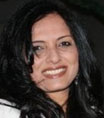
Jayshree Pandya is the Founder of Risk Group LLC and sits on the advisory boards of several organisations and advises/consults nations, its government,industries,organisations as well as academia in understanding and navigating the risks and issues related to their specific efforts. Dr. Pandya is quoted in several trade journals and books and has authored numerous( Scientific, Business and Management)articles published in International journals.She actively provides speaking engagements and is an invited speaker at many Global Conferences.She is set to deliver her first book on Global Risks in 2010.
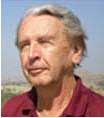
Swiss by birth, Fr. Hermann Bacher came to India in 1948 as a Jesuit priest. Profoundly affected by the distress of the poor in the drought prone district of Ahmednagar, in the hinterland of Maharashtra, Fr. Bacher decided to devote his life to their social and economic upliftment.
In 1968, he founded the Social Centre, an NGO, to develop land, water and agricultural resources of the small and marginalized farmers. However, with frequent and severe drought regularly reversing gains made, Fr. Bacher realized that a change in strategy from resource extraction and utilization, to resource mobilization and conservation was called for, in order to mitigate the impacts of drought and secure advances made. He conceived the idea of making participatory watershed development a people’s movement for poverty reduction through environmental regeneration.
In 1989, he conceived and launched the path breaking and highly regarded bilaterally funded program called the Indo German Watershed Development Program (IGWDP) in Maharashtra. In 1993, he co-founded the Watershed Organisation Trust (WOTR) and continues to serve as its Chairman.
In 1994, Fr. Bacher was awarded Germany’s highest civilian Award, the Federal Order of Merit, Class 1 by the German Minister for Economic Development and Cooperation in Mendhwan, the very village where Fr. Bacher had successfully mobilized the people to regenerate their watershed. In the same year, the Govt. of Maharashtra bestowed upon him the Krishi Bhushan in recognition of his outstanding services to farmers in the state.
Fr. Bacher, affectionately called “Baba” by villagers, has been instrumental in helping hundreds of thousands of farmers free themselves from poverty and has touched the lives of millions of Indians through his dedication, zeal and perseverance. He is rightly referred to as the “Father of participatory watershed development in India” for making it into a movement and having, almost single handedly, contributed to demystifying watershed technology, making it widely accessible to villagers and ensuring its widespread dissemination across the country. He dreams of the day when every dusty, rain dependant and drought-affected village in India will awaken to its latent potential and organize itself to regenerate the watersheds they live in, so that every drop of falling rain can be conserved within the village itself and become a source of life, wealth and joy.
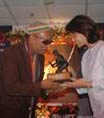
Gautam Ghosh worked with Bangladesh’s leading Bengali-Rock vocalist Mac (Maqsood –al-Haq) from the most famous band in Dhaka called Feedback, on the country’s 25th independence anniversary and the album went on to become a mega hit. In 1997, his songs “fifty-fifty” and “ley sunn ley” from his human rights private album called “OPEN YOUR EYES” were labelled ‘anti-establishment’. In 2001 he was appointed an honorary Human Rights Ambassador by the British Council and brand ambassador by ACTION AID INDIA. He is the first Indian musician to be thus honoured. Under the British Council’s program on Human Rights, he toured UK and Europe with his songs and participated in the most prestigious Edinburgh Festival 2001, Notting Hill fest 2001 and the Bastille Day fest 2001 in Paris. The Gautam Ghosh collective has been promoting 9/11 every year as the Global ONEness Day, which began as the Sadbhavna (ONEness) movement with MTV and other partners in 2002

Gregory David Robert’s novel SHANTARAM has been acclaimed as ‘a masterpiece’ by a number of critics and reviewers across the globe. He has devoted much time, energy and money in helping to raise the health standard of the people living in the Cuffe Parade Zhopadpatti (Ambedkar Nagar). Gregory David Roberts works as an ethical consultant for major international corporations. Further, he has focused on employment and education related issues. He has himself funded ‘THE SHANTARAM’ initiative and never accepted from anyone. Mr. Gregory Roberts has been closely involved in providing free, open and universal education to the poor. His Shantaram initiative works towards educating poorest of the poor, in order to help break the poverty cycle that keeps families without access to education. He has also been working with like-minded charities like Akanksha and The Heart for India Foundation, to create positive synergies and expand his work.
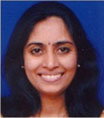
Jamuna Rangachari has authored two books for children, One (Rupa & Co, 2005), a collection of short stories on all the world religions, and The Magic Liquid (Rupa & Co, 2005), an adventure tale with a sprinkling of values. She is the assistant editor of Life Positive and has also written for the Times of India, Hindustan Times, Daily News and Analysis, New woman and others. She has also been published in the Chicken soup series.
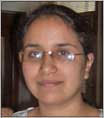
AIESEC
Designation : Vice President- Development Sector
Organization : AIESEC in Delhi University
Date of Birth :14th May, 1987
Schooling : 10 +2 from Mater Dei School, Tilak Lane, New Delhi Currently pursuing B.A (hons) in English Literature from Lady Shri Ram College(2nd year)
Interests : Playing Basketball, Listening to music, Reading Indian authors
Future Plans : I see myself in a capacity building role working for an NGO or exploring opportunities for Social Entrepreneurship or Corporate Social Responsibility
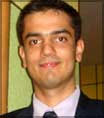
Graduated with a Degree in Economics Honours from Delhi. University. President of AIESEC in Delhi University.
Interests: Entrepreneurship, leadership, technology and impacting other social issues.
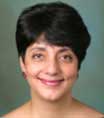
Meera H. Sanyal is Country Executive - ABN AMRO Bank, India & Chairperson ACES.
Meera started her career in 1984 with Grindlays Bank PLC(now a part of the Standard Chartered Group). In 1987 she joined Lazards and was Head of International Finance & Advisory Services.
She joined ABN AMRO in 1992 as Head of Structured Finance,responsible for setting up the Corporate Finance & Project Finance business in India. In 1997 she took over as Head of Corporate Finance Advisory for Asia, based in Singapore, and handled several restructuring mandates post the 1997 Asian crisis. She assisted with the bank’s Valuation and Acquisition of Bank of Asia (Thailand) and Bank of America’s Consumer Operations in Taiwan, Singapore and India.
As the COO for India in 1999 she undertook the integration of Bank of America’s retail operations and also led the implementation of the Core Banking and Internet platforms for the Consumer Bank in India. She was responsible for setting up and establishing ACES - ABN AMRO’s global shared services BPO – in India in 2001, and was appointed its Managing Director. In January 2006, she became the Regional Head of Services for ABN AMRO Bank Asia, responsible for Operations, Information Technology and Corporate Services for 16 Asian countries and ACES.
Meera is a Fellow of the Chartered Institute of Bankers, UK and an MBA from INSEAD, Fontainebleau, France. She has done her advanced management program from the Harvard Business School. In addition to English and 3 major Indian languages, she is fluent in French and Russian and has studied German, Mandarin and Japanese.
Meera is an active participant in various Sustainable Development initiatives of the Bank that focus on children, women and environment. She is the Chairperson of ABN AMRO Foundation India, and on the Board of Directors of AIESEC India.
She is married with two children and enjoys sailing, chess, traveling and reading.
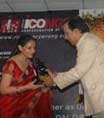
Mita Kapur- Founder Siyahi
Siyahi was founded by Ms. Mita Kapur along with a group of eminent members of the literati, who truly believed in the power of the written word. Ms. Kapur answered her true calling after graduating with honours from the University of Delhi by taking up a career in journalism with a purpose. She has fought relentlessly for the cause of the downtrodden and Dalits, and for cases of domestic child labour abuse. As a part of Siyahi, she doubles up as a literary agent along with conceptualising and directing literary events. She is also Advisor and Senior Consultant for Bookaroo – the first ever children’s literature festival in India, being held in collaboration with the German Book Office in November 2008. Other than social and human rights issues, she has written extensively about developmental and environmental issues, along with concerns within the publishing industry. Her commitment to making a difference was made apparent when she single-handedly volunteered and put together an unprecedented Indian International Literary Festival.
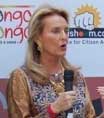
Her highness, Princess Francoise is currently the CEO for the Heart for India Foundation – a foundation that feeds 1300 children everyday at a school for the poor at Namangalam, close to Chennai. The work at Namangalam School has progressed, with many projects and its success has seen it officially listed by the Government of Tamil Nadu as a “Model School” for India. Not just this, Namangalam School has now become an inspiration for the other schools of similar nature. From providing the basic amenities to children to improve their education standards, her organization has constantly worked towards supporting them. She has devised numerous charity projects under her Association of the friends of Romania that provides housing facilities for the orphaned and elderly. Along with her husband, she is now working towards supporting her charity and creative projects involving films, music and television.


